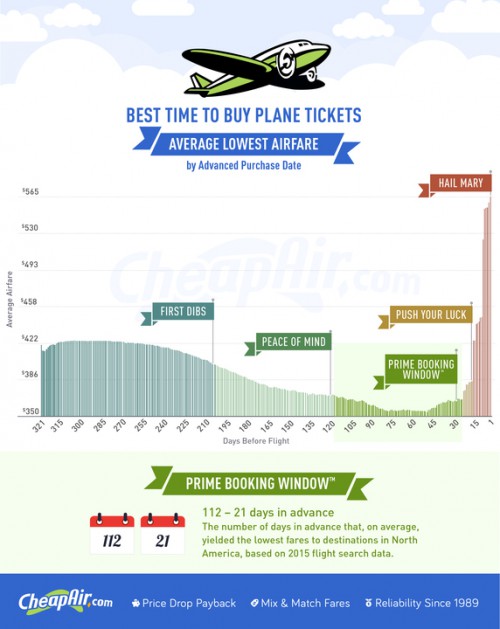
You might also like:
AIRLINES and price comparison sites profusely tell us how to score the cheapest flight tickets.
Or you might decide against going on holiday solely based on the price of a flight ticket. Frequent travelers also know the pains of discovering a dramatically reduced fare the day after booking a flight.
Airline fees fluctuate based on real-time calculations of supply and demand, but travelers can often find it exasperating, especially if flying often. Based on online travel agent CheapAir, flight-purchasing is a unique marketplace, and is like playing the stock market.
But is it worth the headache? We break it down.
How many days in advance?
CheapAir analyzed three million flights last year, and results concluded that the cheapest time to book a flight was 54 days in advance of your trip. The study tracked ticket prices 320 days in advance of a trip all the way down to the day before, and documented the prices through each stage.
The results are documented in this graph:
Pic: CheapAir
The “First Dibs” zone is roughly 11 months in advance, when flights first open for sale and prices are generally high. But a perk of being a “First Dibs” buyer is the options available on seats, especially when traveling with kids or the elderly.
However, Rick Seaney, chief executive of price comparison site Fare Compare, said booking too early can be costly.
“Airlines don’t start actively managing the price of seat on a particular flight until about three months before departure for domestic flights and five or six for international trips,” he said. “That’s when price-cutting typically begins.”
The next stage is “Peace of Mind”, three to six months before a flight and a common window for travelers. Bookings made at this stage don’t vary too far off in price compared with those made in the “Prime Booking Window”, as you could only be saving as little as US$20 per ticket on average.
The “Prime Booking Window” is where you want to be. Sitting comfortably at 21 to 112 days before a flight, this stage sees the lowest fares.
During this period, prices are likely to fluctuate wildly, so don’t be alarmed if you see big swings. Even if you do score a cheap ticket, it might not be without culling through mid-range and high fares along the way.
The “Push Your Luck” zone a couple of weeks before a flight is where many business travelers might book their flights. By this time, flights may be full and fares through the roof, but the probability is dependent on the destination and its peak season.
Lastly, the “Hail Mary” stage is risky, to say the least. Not only are flights to popular destinations usually booked out by this point, you could also be paying up to US$200 more than if you had bought a ticket during the prime window.
While some travelers and agents claim booking a flight the day before its departure will score you the cheapest tickets, according to present data, this is completely false. The myth that airlines “give away” cheap seats at the very last minute is most definitely untrue.
However, the 54-day rule doesn’t necessarily apply to those outside of the US. This handy chart on The Wall Street Journal is a guide for other regions:

Pic: WSJ
Weekend or weekday?
Research by travel agent Airlines Reporting Corporation skews towards Friday being the day to avoid when booking flights.
The study, based on the purchase of hundreds of millions of tickets, concludes that Friday is the most expensive day of the week to book a flight, sometimes up to 13 percent more than if booked on a Sunday.
This report quoted a reason: “Leisure travelers tend to book discount trips more heavily on weekends, while business travelers typically pay higher fares booking reservations at the end of the work week.”
Greg Schulze, Expedia’s senior vice president of global tour and transport said that Fridays were expensive because airlines launch price hikes and would typically run out of cheap seats.
Although there isn’t a clear day for the cheapest tickets, he added that good deals were often found on Saturdays and Sundays.
Tuesday is considered to be the least expensive weekday because airline executives come to work on Monday and look at sales over the weekend. Following this, they might implement discounts into the system.
Do seasons matter?
Yes, seasons matter. A lot. If you’re traveling to say, New York in winter, prices will be far lower than if you were visiting in the summer. Meanwhile, the Christmas season, summer and spring break seasons are naturally more expensive.
Seasonal prices are moderated from supply and demand, so the more people are interested in a flight during a particular period, the more expensive fares are. International events like terror attacks or a migrant crisis can also skew the figures massively.
If you’re not sure when the high-peak seasons are at your destination, a simple hack may solve it. Monica Stott of Thetravelhack.com advises to “search the ‘whole month’ rather than a specific date and you will find the cost of the flights for every day that month”.
Flying out a day, a week, or a month earlier than initially intended could lead to much bigger savings.
The post When is the cheapest time to book a flight? appeared first on Travel Wire Asia.
Source: travelwireasia.com
